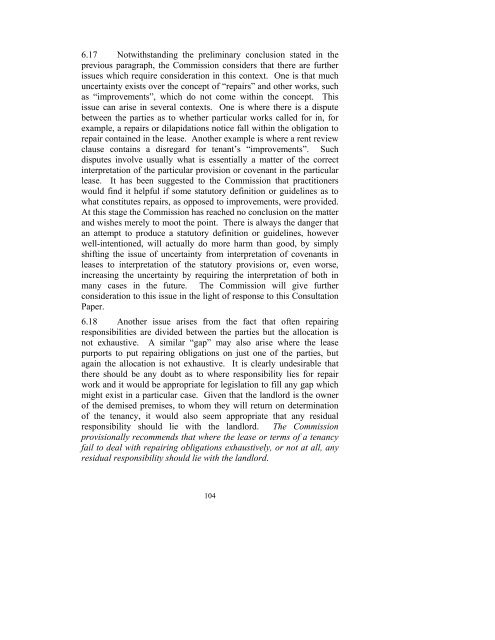Consultation Paper on the General Law of the Landlord and Tenant
Consultation Paper on the General Law of the Landlord and Tenant
Consultation Paper on the General Law of the Landlord and Tenant
Create successful ePaper yourself
Turn your PDF publications into a flip-book with our unique Google optimized e-Paper software.
6.17 Notwithst<strong>and</strong>ing <strong>the</strong> preliminary c<strong>on</strong>clusi<strong>on</strong> stated in <strong>the</strong>previous paragraph, <strong>the</strong> Commissi<strong>on</strong> c<strong>on</strong>siders that <strong>the</strong>re are fur<strong>the</strong>rissues which require c<strong>on</strong>siderati<strong>on</strong> in this c<strong>on</strong>text. One is that muchuncertainty exists over <strong>the</strong> c<strong>on</strong>cept <strong>of</strong> “repairs” <strong>and</strong> o<strong>the</strong>r works, suchas “improvements”, which do not come within <strong>the</strong> c<strong>on</strong>cept. Thisissue can arise in several c<strong>on</strong>texts. One is where <strong>the</strong>re is a disputebetween <strong>the</strong> parties as to whe<strong>the</strong>r particular works called for in, forexample, a repairs or dilapidati<strong>on</strong>s notice fall within <strong>the</strong> obligati<strong>on</strong> torepair c<strong>on</strong>tained in <strong>the</strong> lease. Ano<strong>the</strong>r example is where a rent reviewclause c<strong>on</strong>tains a disregard for tenant’s “improvements”. Suchdisputes involve usually what is essentially a matter <strong>of</strong> <strong>the</strong> correctinterpretati<strong>on</strong> <strong>of</strong> <strong>the</strong> particular provisi<strong>on</strong> or covenant in <strong>the</strong> particularlease. It has been suggested to <strong>the</strong> Commissi<strong>on</strong> that practiti<strong>on</strong>erswould find it helpful if some statutory definiti<strong>on</strong> or guidelines as towhat c<strong>on</strong>stitutes repairs, as opposed to improvements, were provided.At this stage <strong>the</strong> Commissi<strong>on</strong> has reached no c<strong>on</strong>clusi<strong>on</strong> <strong>on</strong> <strong>the</strong> matter<strong>and</strong> wishes merely to moot <strong>the</strong> point. There is always <strong>the</strong> danger thatan attempt to produce a statutory definiti<strong>on</strong> or guidelines, howeverwell-intenti<strong>on</strong>ed, will actually do more harm than good, by simplyshifting <strong>the</strong> issue <strong>of</strong> uncertainty from interpretati<strong>on</strong> <strong>of</strong> covenants inleases to interpretati<strong>on</strong> <strong>of</strong> <strong>the</strong> statutory provisi<strong>on</strong>s or, even worse,increasing <strong>the</strong> uncertainty by requiring <strong>the</strong> interpretati<strong>on</strong> <strong>of</strong> both inmany cases in <strong>the</strong> future. The Commissi<strong>on</strong> will give fur<strong>the</strong>rc<strong>on</strong>siderati<strong>on</strong> to this issue in <strong>the</strong> light <strong>of</strong> resp<strong>on</strong>se to this <str<strong>on</strong>g>C<strong>on</strong>sultati<strong>on</strong></str<strong>on</strong>g><str<strong>on</strong>g>Paper</str<strong>on</strong>g>.6.18 Ano<strong>the</strong>r issue arises from <strong>the</strong> fact that <strong>of</strong>ten repairingresp<strong>on</strong>sibilities are divided between <strong>the</strong> parties but <strong>the</strong> allocati<strong>on</strong> isnot exhaustive. A similar “gap” may also arise where <strong>the</strong> leasepurports to put repairing obligati<strong>on</strong>s <strong>on</strong> just <strong>on</strong>e <strong>of</strong> <strong>the</strong> parties, butagain <strong>the</strong> allocati<strong>on</strong> is not exhaustive. It is clearly undesirable that<strong>the</strong>re should be any doubt as to where resp<strong>on</strong>sibility lies for repairwork <strong>and</strong> it would be appropriate for legislati<strong>on</strong> to fill any gap whichmight exist in a particular case. Given that <strong>the</strong> l<strong>and</strong>lord is <strong>the</strong> owner<strong>of</strong> <strong>the</strong> demised premises, to whom <strong>the</strong>y will return <strong>on</strong> determinati<strong>on</strong><strong>of</strong> <strong>the</strong> tenancy, it would also seem appropriate that any residualresp<strong>on</strong>sibility should lie with <strong>the</strong> l<strong>and</strong>lord. The Commissi<strong>on</strong>provisi<strong>on</strong>ally recommends that where <strong>the</strong> lease or terms <strong>of</strong> a tenancyfail to deal with repairing obligati<strong>on</strong>s exhaustively, or not at all, anyresidual resp<strong>on</strong>sibility should lie with <strong>the</strong> l<strong>and</strong>lord.104
















